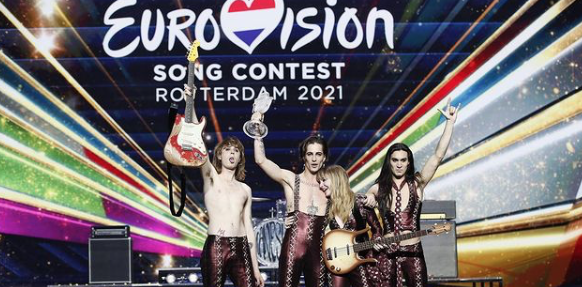Eurovision has been described as the largest musical event in the world, and Italy just bagged the victory for the 2021 edition. But how much do you actually know about the competition? From the extravagant, borderline bizarre nature of the contest, to the starlight careers it launched (hi ABBA) Here are some facts to sharpen your Euro’vision’.
Eurovision Song Contest is the world’s largest musical showcasing event. It’s arguably more of a cultural institution than simply a competition. Known for its flamboyance and flare-fueled performers, political controversy and all-around wild cultural showcasing of various countries’ musical talents, it’s quite an interesting concept as a whole.
Especially when we consider South Africa’s biggest singing competitions wherein which ‘extra’ performances to the Eurovision extent are the exception and definitely not the rule. I mean, can we imagine seeing a hard rock version of Hallelujah where a man is dressed in a demon costume on Idols??
For the 2021 edition, Italy’s Maneskin took home the win thanks to a hard-rocking song called “Zitti E Buoni”. Eurovision 2021 also marks the first major cultural competition to take place in person since the pandemic struck. Maneskin outdid the competition, who included an Icelandic disco-band and a folk-techno act (Ukraine).
If your interest is peaked about the wildness of this competition, we beckon your curious mind further.
Here’s a little more about the competition Italy won, with some interesting, strange and stranger facts to give you the vision.
What is Eurovision?

- Eurovision is the annual song competition and cultural showcasing that consumes the European region and other parts of the world. It is essentially a musical extravaganza where different countries compete for the leading title, based on the votes from the other competing countries and the public. According to Forbes, “it’s a serious cultural force” with extravagant, political or utterly unexplainable productions.
- Eurovision is the world’s largest musical event, according to Forbes and The New York Times.
- How it works: 26 countries make it to the grand final (20 from the semi-final and 6 who qualify automatically. The automatic qualifiers consist of the previous year’s winners, alongside the big financial backers who are Spain, Italy, France, Germany and the UK.
- The winner is chosen by being the country to receive the most points from its competitors.
Interesting, strange and stranger facts about Eurovision
- It started as a way to cheer Europe up after WWII (1956)
- Scandinavian countries are particularly fond (95% of viewers in Iceland tuned in to watch a final they hadn’t even qualified for according to Forbes)
- It’s outshone events like the Super Bowl in numbers. 182 million people watched the Tel Aviv contest (2019), according to the European Broadcasting Union. Only 114 million people made up the Super Bowl’s record high.
- It was made into a Netflix hit: Eurovision Song Contest: The Story of Fire Saga, starring Will Ferrell and Rachel McAdams because of its curious and entertaining nature.
- It’s known for wild and wonderful fashion.
View this post on Instagram
View this post on Instagram
- The fashion aspect of the show has only gotten more wonderful and curious over the years. Feathers, flare, metallic glows and technology have always been a part of the performance. Recently, 2018 saw technology create a projection dress, and 2021 saw designers inspired by the flamboyant fashion that the film version of the show portrayed, and decided to make it a reality.
- The contest launched the careers of many iconic bands and singers, including ABBA (Sweden) and Celine Dion (Switzerland, despite not being from that country).
- A national jury does the voting (now alongside televises) but If there is a tie among the national jury members’ votes, the youngest member decides.
- It’s known for political controversy
- Ie: Ukraine’s 2007 entry which saw a disco ball-clad drag queen who sparked controversy for Russia and Iceland’s 2019 act which boasted Palestinian flags at a final in Tel Aviv and was booed as a result.
- Keep trying: Norwegian’s have ended in last place a record nine times.
What’s next for Eurovision?
It’s heading to the USA, transforming into the American Song Contest.
Picture: Instagram @eurovision

